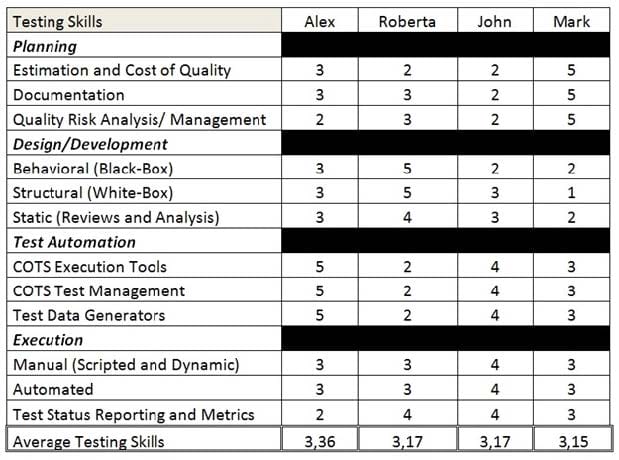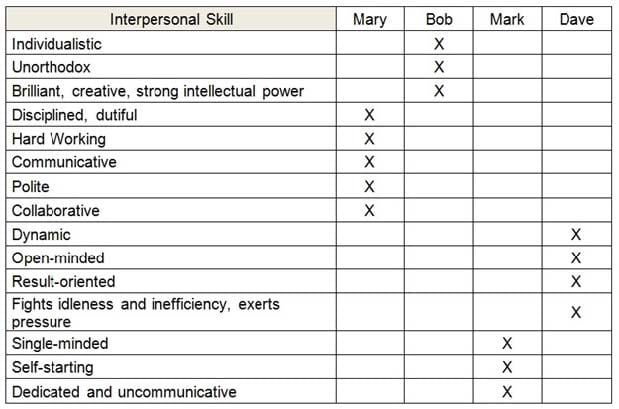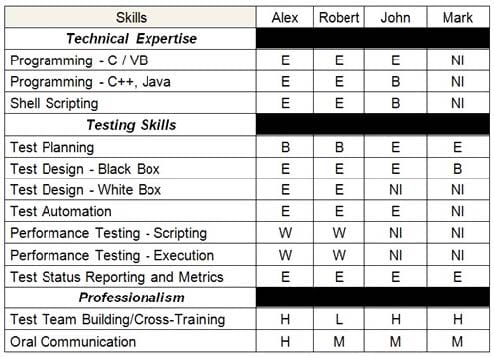Exam Details
Exam Code
:TM12Exam Name
:ISTQB-BCS Certified Tester Advanced Level- Test Manager (2012)Certification
:ISTQB CertificationsVendor
:ISTQBTotal Questions
:65 Q&AsLast Updated
:Jul 07, 2025
ISTQB ISTQB Certifications TM12 Questions & Answers
-
Question 1:
Which of the following would you expect to be most likely an example of a motivating factor for testers?
A. The resources allocated for the testing activities are not sufficient and don't allow the testers to contribute to the quality of the product.
B. The testers contribution to the quality of the software products developed from an organization is recognized with increased responsibilities.
C. The same regressions tests are executed manually by the same testers, for every product release, without any progression in content.
D. The testers are asked to perform, in parallel with their testing tasks, other tasks unrelated to their testing responsibilities.
-
Question 2:
Which of the following would you expect to be most likely an example of a demotivating factor for testers? (Choose two.)
A. The management asks the testers to be kept informed about the intensity, quality and results of testing.
B. The testers' recommendations to improve the system or its testability are adopted by the development team.
C. The same regressions tests are manually executed by the same testers, for every product release, without regression test tools.
D. The testers are assessed on whether and how often they detect important and critical failures.
E. Test quality is measured by counting the number of customer/user reported problems.
-
Question 3:
Assume you are managing the system testing execution phase of a project.
The system test execution period for that project is scheduled for eighteen weeks and the release date is
scheduled at the end of system testing.
During the sixth week of system test execution, at the staff meeting, the project manager informs you that
the project deadlines are changed and the release date that is only three weeks ahead.
This new release will not allow the completion of the system tests. Suppose also that you have followed a
risk-driven test approach for this project.
Which of the following statements represents the worst way to lead your test team in the next three weeks?
A. Neglect your management activities and work side-by-side with your test team executing tests.
B. Considering the executed tests, you should reduce the test coverage back on the risk analysis and adjust downward the priority of the associated risk items.
C. Convince all the people of your test team that each of them is an important and needed member, and that their contribution is fundamental to the success of the team.
D. Favor and encourage a proactive attitude where people ask for new tasks as soon as they finish their current tasks.
-
Question 4:
An agile development team decides to hire a tester who has always worked:
in independent test teams, reporting the problems found in a defect tracking system
in safety-critical projects, with a stronger focus on the quality of the product than on time and budget.
This agile team is focused on short-term goals to get the product released on time and within budget.
Which of the following answers would you expect to be most likely true in this scenario?
A. Agile teams like the presence of a tester in their teams and the tester will be able to adapt to the new context without any issue.
B. The developers will immediately follow the guidelines described by the tester.
C. The tester can continue to report the problems found in a defect tracking system and be more focused on the quality than on time and budget constraints.
D. The tester's mission could be to verify adherence to requirements, instead of reporting formally the problems in a defect tracking system.
-
Question 5:
Consider the following analysis of testing skills performed on four people: Alex, Robert, John and Mark (all the skills have been rated on an ascending scale: The higher the score, the better the skill): Which of these people, based on this analysis, would you expect to be most suitable to work specifically as test designer?

A. Alex
B. Roberta
C. John
D. Mark
-
Question 6:
Your test team consists of four members (Mary, Bob, Mark, Dave) with different interpersonal skills.
The following skills assessment spreadsheet shows the characteristics of the team members with respect to a list of interpersonal-skills (for each characteristic only the member with the highest level of that characteristic is indicated and marked with `X'): On the next project a member of your test team will have to perform some routine tasks requiring collaboration with other teams.

Who in your test team would you expect to be most suitable at doing these tasks?
A. Mary
B. Bob
C. Mark
D. Dave
-
Question 7:
You are using this skills assessment spreadsheet in order to define a training development plan for your test team.
Your objective is to fill the skill gaps by having at least a team member rated as an expert for each skill identified for the "technical expertise" and "testing skills" sections, and with the ability to train the other team members.
Considering the budget constraints you can send only one person to a training course.

Based only on the given information, which of the following answers would you expect to be the best option to achieve your objective?
A. Send Robert to a performance testing training course.
B. Send Alex to a performance testing training course.
C. Send John to a performance testing training course.
D. Send Mark to a test automation training course.
-
Question 8:
Assume you are a Test Manager involved in system testing of a CRM application for a Pay-TV company. Currently the application is able to support a proper number of users assuring the required responsiveness. Since the business is expected to grow, you have been asked to evaluate the ability of the application to grow to support more users while maintaining the same responsiveness.
Which of the following tools would you expect to be the most useful at performing this evaluation?
A. Coverage tools
B. Test management tools
C. Static analysis tools
D. Performance tools
-
Question 9:
After a selection process you have selected a test management tool that is going be introduced in your organization and used by your test team in a pilot project.
You have already identified the member of your test team who will be the administrator of the tool, since he/she has a significant experience with the administration of test management tools and so he/she is able to make effective and efficient up-front decisions about "how" the tool will be used. You have also developed a training plan for the other members of your test team.
In collaboration with the administrator of the tool you have also devised standard ways of managing, storing and maintaining the tool and its assets including backup/restore procedures.
You have also analyzed standard formats supported by the tool (CSV, XLS, XML, etc.) to export, import and archive all the information managed by the tool itself (requirements, test case specifications, test plans etc.) for compliance with the most important test management tools, in order to minimize the impacts of migrating this information to a new tool that could replace the existing one in the future.
Which of the following phases in the lifecycle of the new tool has NOT been adequately considered in this description?
A. Acquisition
B. Support and maintenance
C. Evolution
D. Retirement
-
Question 10:
Assume you are managing a test automation project for a mission-critical system.
Because vendor provided tools and open source solutions don't meet the needs of this project, you ask your test team to develop a custom automation framework.
Which of the following management issues associated to the development of this custom automation framework is least likely to manage?
A. Proper testing for the custom automation framework must be performed.
B. The custom automation framework will require an adequate documentation.
C. The changes to the custom automation framework should be communicated to all external users of this tool under the GNU license.
D. The custom automation framework will need proper maintenance.
Related Exams:
ISTQB-AGILE-PUBLIC
ISTQB Agile Public SectorISTQB-ATM
Advanced Test Management Exam v 3.0 – ISTQBISTQB-CT-AI
ISTQB Certified Tester AI TestingISTQB-CT-PT
ISTQB Certified Tester Foundation Level - Performance TestingISTQB-CT-TAE
ISTQB Certified Tester Test Automation EngineerISTQB-CTAL-TA
ISTQB Certified Tester Advanced Level - Test Analyst (CTAL-TACore)v3.1.2ISTQB-CTAL-TM
ISTQB Certified Tester Advanced Level - Test Management (CTAL-TM) v3.0ISTQB-CTAL-TTA
ISTQB Certified Tester Advanced Level - Technical Test AnalystISTQB-CTFL
ISTQB Certified Tester Foundation Level (CTFL v4.0)
Tips on How to Prepare for the Exams
Nowadays, the certification exams become more and more important and required by more and more enterprises when applying for a job. But how to prepare for the exam effectively? How to prepare for the exam in a short time with less efforts? How to get a ideal result and how to find the most reliable resources? Here on Vcedump.com, you will find all the answers. Vcedump.com provide not only ISTQB exam questions, answers and explanations but also complete assistance on your exam preparation and certification application. If you are confused on your TM12 exam preparations and ISTQB certification application, do not hesitate to visit our Vcedump.com to find your solutions here.